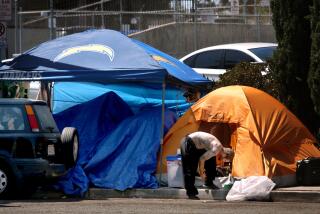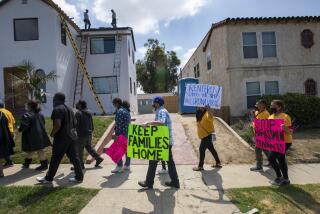Supervisors OK Law Banning AIDS Bias : Health: The board votes 3 to 2 for the ordinance. Two dozen speakers heatedly debate the issue.
After two hours of sometimes emotional testimony, a divided Ventura County Board of Supervisors adopted a law prohibiting discrimination against residents with AIDS and other life-threatening illnesses.
The issue sparked heated debate by two dozen speakers, including several AIDS care workers, nurses, a lawyer, an insurance agent, a woman who described herself as a pro-family activist and two men who are afflicted with the deadly disease.
The county’s first AIDS anti-discrimination law makes it illegal for businesses to deny housing, employment, education and medical services to people because they have AIDS or other communicable or life-threatening diseases.
“I can attest to the fact that discrimination takes place in Ventura County and is widespread,” said Thomas Richard Pistulka, an Ojai resident with AIDS. He said a doctor refused to treat him because of the disease.
In contrast, opponents of the ordinance said it would jeopardize public health by taking away an employer’s power to refuse work to people with acquired immune deficiency syndrome.
“This is a cover-up for the homosexual agenda, and we cannot force this on the community,” said Clara Davis, spokeswoman for the American Family Assn. of Ventura County, which she said has 700 members.
The supervisors voted 3 to 2 for the law, with Supervisors Vicky Howard and Maria VanderKolk opposed. The two supervisors said that they support the idea behind the law but that it leaves many questions unanswered.
At a previous hearing, Howard said she opposed the law because she was worried about how it could hurt small companies that could lose their medical insurance if they employ a person with AIDS.
On Tuesday, she said she is also concerned that the law only applies to the unincorporated area of the county, where 13% of residents live, and not in the county’s 10 cities.
“I cannot support this particular ordinance at this time,” Howard said. “But I will fight discrimination.”
VanderKolk said she agreed with Howard’s position.
Supervisors John K. Flynn, Maggie Erickson Kildee and Susan Lacey voted to adopt the ordinance, saying it would provide residents much-needed protection from discrimination.
“I’m not a preacher,” Flynn said. “I’m not going to preach love, but I’m going to preach common sense.”
Several other counties and cities in the state have adopted similar ordinances, including the city of Los Angeles and San Diego County. The California Fair Employment and Housing Act also prohibits discrimination against people with AIDS.
But county Medical Director Lawrence E. Dodds said the county’s ordinance extends that protection to people with other communicable diseases such as chronic hepatitis B and life-threatening diseases such as cancer.
Ventura County Counsel James McBride said the county’s ordinance applies to cases of discrimination that may not be addressed by current laws.
“There are a lot of gaps and holes in the laws,” he said.
Unlike the law in Los Angeles, which requires the city attorney to file AIDS discrimination suits, the Ventura County ordinance would only give residents a basis for filing a civil lawsuit.
There have been 227 reported cases of AIDS in the county, health officials said, with 158 deaths reported by mid-June. Up to 2,000 people in the county might be infected with the AIDS virus, officials said.
In contrast to a July 16 hearing, which attracted mostly critics of the law, Tuesday’s meeting attracted both supporters and opponents.
Bill Hayes of Oxnard said he opposed the law because it would not allow a business owner to use common sense when doing business with a person with AIDS. He used the example of a banker being forced by the law to give a loan to someone with AIDS.
Several critics of the ordinance said they believe that the law is not necessary because discrimination against people with AIDS is not widespread.
Al Karlsbarch, an engineer from Moorpark, disagreed.
He said he is a hemophiliac who got AIDS from a blood transfusion and that he has been fired from eight jobs after employers told him that they needed to cut their budgets.
“It seems I’ve always encountered being in that cutback,” he said.
The hearing also prompted debate about how the AIDS virus can be transmitted.
Kathleen Parsa, a nurse from Ventura, said the AIDS virus is not as fragile as most medical authorities say. She suggested that a law should be passed to require mandatory AIDS testing for food handlers and health-care workers.
Several AIDS care workers, including Reese Welsh, executive director of AIDS Care in Ventura, urged the supervisors to ignore the “AIDS hysteria” and ignorance about the disease.
“This ordinance is not about sexual preference, it is about social justice,” he said.
More to Read
Sign up for Essential California
The most important California stories and recommendations in your inbox every morning.
You may occasionally receive promotional content from the Los Angeles Times.










